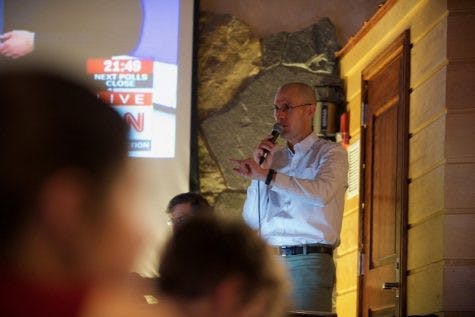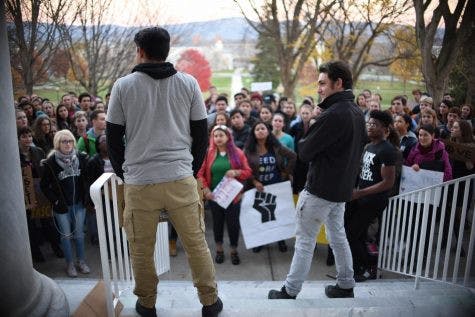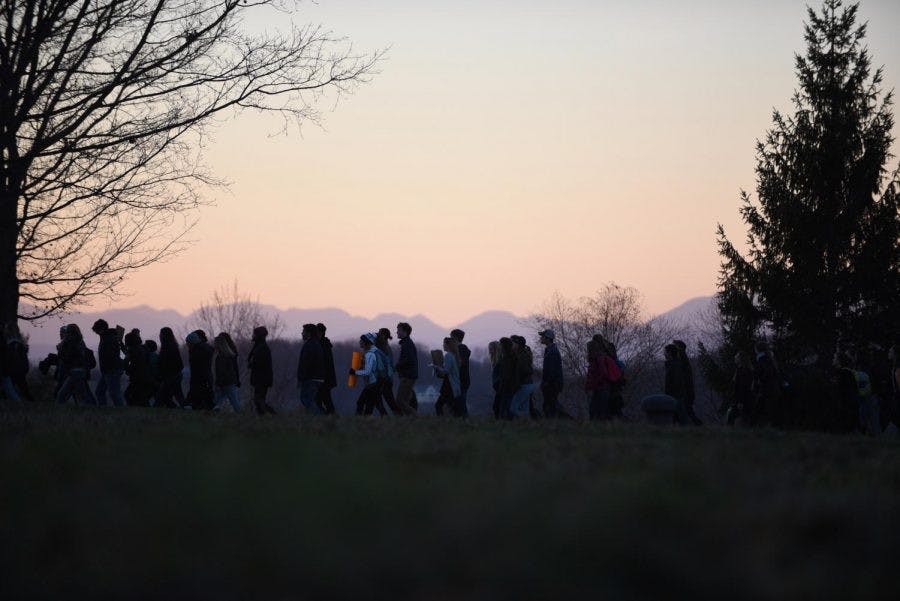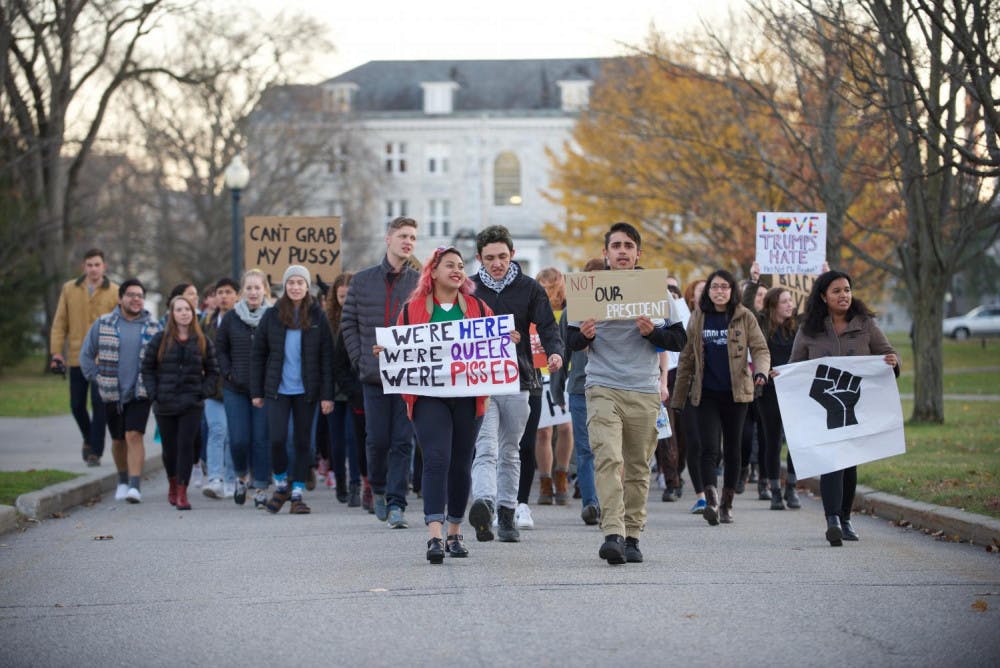News of Donald J. Trump’s election as the nation’s 45th president sent waves of shock and uncertainty throughout campus, prompting students to stage protests against the president-elect and discussions of what the next four years will bring.
For many, election night was a surprising and ultimately devastating display of the American electoral system at work. The long election season culminated in a packed Crossroads Café Tuesday night Nov. 8. When, at 7 p.m., Vermont projected to go for Hillary Clinton, the group of mostly liberal-leaning students cheered loudly, proud of the state for being the first in the country to vote for Clinton.

Professor of Political Science Bert Johnson provided commentary on the election to students who gathered in Crossroads Cafe on Nov. 8 to watch the results come in.
Most students felt optimistic at this point, and Crossroads had a celebratory feel. People chatted with friends and shouted happily when early states were projected for Clinton. For some students, a Clinton victory was all but inevitable.
“I’m very confident in a Hillary victory; I’m just curious to see how much America will go for Trump,” James Callison ’17.5 said early in the night. “The only thing I am concerned about, however, is the Senate election. I’m worried it’s going to go 51-49 Republicans.”
Others did not share Callison’s certainty, but nonetheless felt that Clinton would most likely end up pulling through.
“[I feel] sort of cautiously optimistic, which is bad, because you want to feel hopeful that reasonably optimistic predictions from statisticians and political watchers… are solid predictions that you have faith in,” Noah Liebmiller ’17.5 said. “But at the same time, there’s a lot of self-doubt. I would hate to have my hopes crushed at the end of the day. One in four things happen all the time. Cubs came back from 3-1 the other day. Cavaliers came back from 3-1 in July. Nothing’s ever sure.”
At the same time, Liebmiller felt excited for election night and looked forward to watching the contest unfold.
“We’ve been waiting for this to happen for almost two years, and every day it got a little bit more intense, and so many crazy things have happened,” he said. “If you’re a nerd who loves politics, this is like Christmas morning, but it’s only once every four years.”
Charlotte Massey ’18, on the other hand, did not have much optimism and half-jokingly explained her contingency plan if Donald Trump were to emerge victorious.
“We’re flying to Europe tomorrow for a debate tournament, so the mindset is, if Trump wins, we’re just staying there,” she said.
In spite of the nerves, the atmosphere remained relaxed and congenial well into the night. Students enthusiastically grabbed free Grille food and watched as Matthew Dickinson and Bert Johnson, professors of political science, commented on the results as they rolled in. Until about 9 p.m., Dickinson and Johnson reiterated that Donald Trump had a very narrow path to victory.
And then it became clear that Trump was outperforming expectations. Dickinson and Johnson began to express surprise as states like Virginia, Michigan and Wisconsin remained extremely close with slight Trump leads.
The hum of conversation in Crossroads softened as students realized what was happening. The cheers for the few states that were called for Clinton became even louder. Conversations turned toward expressions of anger and frustration.
“It really pisses me off that it’s even this close because if she wins it’s still really depressing about what’s happening in America,” Caley Henderson ’18 said.
“So many people seemed so confident, and I thought I was ready mentally for the idea that it was going to be close,” Liebmiller said. “And I’m still not clear whether it’s close yet, but it’s starting to feel really close, and that’s not a pleasant thing.”
By 12 a.m., many of the students at Crossroads were thinking back to that moment that Vermont was projected and wishing the rest of the night would have gone much differently. Crossroads had closed, and Pennsylvania would soon be called for Trump.
At 3 a.m. on Wed. Nov. 9, Trump had been declared victorious and gave his acceptance speech to the nation.
“I felt that the values of America had failed those that are most vulnerable in society,” Callison said later about his reaction when he realized that Trump had won.
He and several other students gathered in Crossroads again on Wednesday morning to discuss the results, express their feelings and commiserate. Political Science professors, including Johnson, Sarah Stroup, Erik Bleich and Orion Lewis, led the conversation and attempted to give students some context for the election. But even they had a challenging time making sense of the results.
“This has been one of the most extraordinary elections in memory, with a result that most political scientists would not have bet on,” Johnson said later. “Those of us who study U.S. elections will now have to examine why the polling data leading up to the election was out of step with the result.”
While the students had come together to watch Hillary Clinton’s concession speech, the gathering ended up being a catharsis of sorts. It was a moment for students and professors alike to try to make sense of the intense emotions they were feeling.
For the rest of the week, many students and staff at the College struggled to figure out how to move forward. Some professors canceled class or delayed tests; others attempted to keep conducting business as usual. But among many students, the overriding emotions were confusion and sadness. Some professors and staff who have worked at the College for many years compared it to the days after the Sept. 11, 2001 attacks; others were shocked at the depth of the emotional response from students.
“I have not seen our campus so paralyzed,” Stroup said. “Optimism and articulation were suspended. Our first years are navigating this historic moment in a new environment. Usually I can find some evidence and arguments from political science to these events, but we all got it wrong -- which requires some humility.”
Johnson perceived the same strong, passionate reaction from students. “The state of alarm on campus is something I have not seen before in my twelve years here,” he said. “I can understand why many are concerned with the result, and to be frank, I share many of their concerns.”

As a result of the election, the College organized several different opportunities later in the week for students and faculty to come together. During one such event, which took place on Friday, Nov. 11, members of the College community broke up into small groups to converse and reflect on the election and how to move forward.
In one group, the participants talked about the different ways that people might get active to make a change, the ability of faculty to take a stance against certain political rhetoric and how people might deal with the despair and hopelessness they feel. The participants agreed to be anonymous, but they all expressed an appreciation for the cathartic effect of the meetings.
For many, the willingness of students to engage in difficult and rewarding discussions at events like this was a particularly bright spot in an otherwise tough week.
“I have been surprised at and comforted by the range of conversations I have had,” Stroup said. “Yes, these are based on little sleep and half-formed thoughts, but people have reached out to discuss and deliberate.”
In response to the results, President of the College Republicans Club, Hayden Dublois ’17, emphasized the crucial importance of being there for those who are marginalized or scared by a Trump presidency.
“Even as a Republican, I’m disgusted by Donald Trump and disagree with his policies. But rather than rioting, I think there is a two-fold response that is more effective. First, be there for those who feel marginalized and scared by a Trump presidency,” said Dublois in an email to the Campus. “Second, oppose Donald Trump’s policies that you disagree with. Call your Congressman or Senator; donate to an interest group; join an advocacy organization — whatever you have to do to oppose the particular policies you disagree with.”
As the days passed, sadness and confusion transformed into anger and a desire to act. In conjunction with several students, Travis Wayne Sanderson ’19 helped plan and organize an election protest, which was held at 4 p.m. on Sunday, Nov. 13 outside Mead Memorial Chapel. Sanderson thought of the idea after taking note of similar events at different campuses. He saw it as a good method to transfer our community’s emotions into a constructive goal.
The Facebook event page, which garnered interested from over two hundred students, read: “Our presidential election has ended in terror for the lives and livelihoods of millions of marginalized people. We cannot sit still in a time of injustice. On Sunday, our Middlebury community will gather at the front steps of Mead Chapel to stand together against racism, fascism, hatred and all forms of oppression. We hope you can join us in standing up in this moment of history.”
Students eagerly gathered around the steps of Mead Chapel right at 4 p.m., with the crowd gradually growing as the protesters made their way down toward Davis Memorial Library. Many students held cardboard signs with slogans reading, “Not My President,” “Stronger Together” and “Love Trumps Hate.” The crowd, comprised of roughly 250 students, chanted as they then made their way across campus from Davis to McCardell Bicentennial Hall. Two of the chants that echoed across campus were “Immigration, Not Deportation” and “Build Bridges, Not Walls.”
Back on the steps of Mead, Sanderson took the stage first. Several speakers followed Sanderson, offering individual stories touching upon topics ranging from immigration reform to discrimination within on our own campus.
“Overall, I’m happy with how the protest went,” said Charles Rainey ’19, a student representative of Community Council, who spoke at the event. “The message is clear — we have a passionate subset of the population, a diverse group of kids that came out to really show that love trumps hate, that black lives matter, that the pussy grabs back and that we stand in solidarity with LGBTQ+ folks. I hope that this leads to a broader discussion for how these values we hold dear, and our feelings about the election, can be translated back on campus and make this campus a more inclusive one.”
As part of his speech, Rainey read two poems by Hanif Willis-Abdurraqib. He emphasized the need to cultivate constructive conversation moving forward.
Moving beyond the protest, Sanderson envisions cultural organizations, as well as other student groups active in inclusivity, helping to continue the dialogue on a more permanent basis. However, he recognizes that this is a democratic effort.
“The conversations that have to be cultivated in the next months and years rely on people and organizations not only hosting them and making the spaces for them, but also on people in dining halls and other spaces making sure there isn’t a tolerance for intolerance in this place,” said Sanderson. “Even if you’re not directly involved, there’s space to be more inclusive and more of an exception to the dominant narrative of intolerance that has taken the nation since last week.”

Trump Victory Roils Campus

MICHAEL O'HARA
Marcelo Lopez '19 (left) and Travis Sanderson stand on the Mead Chapel steps during a demonstration on Nov. 14, 2016.
Students march across campus during a Nov. 14 demonstration following the election of Donald Trump as President of the United States.
Comments


